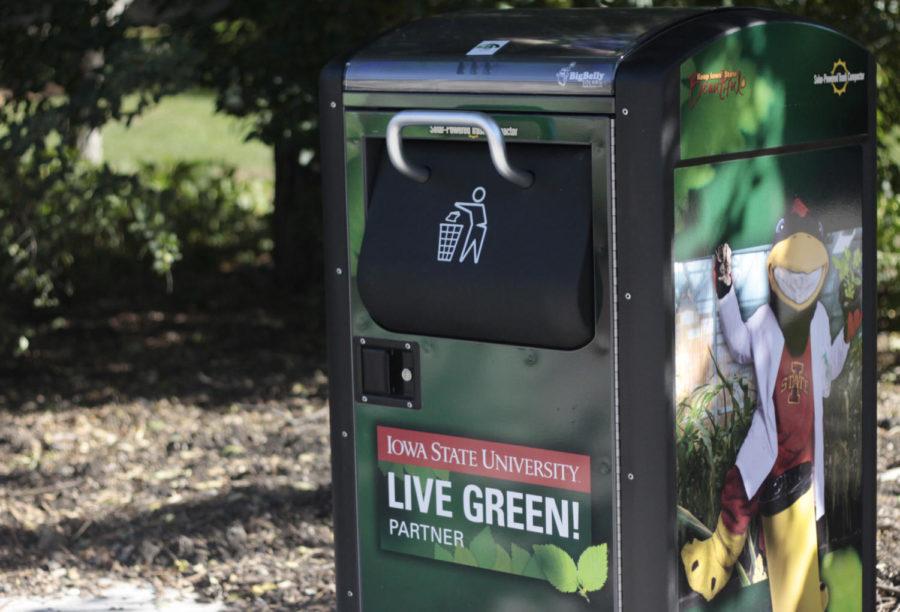Tips for reducing waste every day
Iowa State University receives a 1.00/ 1.00 for our electronic waste recycling program.
July 18, 2019
Reducing waste can impact the population environmentally, economically and socially.
In 2015, 52.5% of waste in the U.S. went to landfills, according to the United States Environmental Protection Agency, while 47.2% of the waste went to recycling, composting and combustion with energy recovery.
Here are some ways to reduce your daily waste:
Product and plastic reduction
Since not all plastics are recyclable, one step toward creating less waste is reducing the amount of plastic, which can range from disposable utensils to grocery bags. The director of the Office of Sustainability, Merry Rankin, said to stick to plastics No. 1 and No. 2.
“For those packaging plastic, the more we could focus on No. 1 and No. 2 plastics — those pretty much universally recyclable and those would be the best choices from that standpoint,” Rankin said.
The difference between the types of plastics comes down to the polymers, according to Eartheasy. Plastic No. 1 has polyethylene terephthalate (PET) which is found in packaging from soft drinks, mineral water, fruit juice and cooking oil. Plastic No. 2 contains a high density of polyethylene (HDPE) which is found in the packaging from milk jugs, cleaning agents, laundry detergents, shampoo and shower soaps.
Being aware of the products that you buy at the grocery store can also help reduce the amount of waste. Rankin said she would recommend bringing a list of items that are needed will help tremendously in the prevention of over-buying products that will eventually be thrown away.
“Being considerate of what you actually need and what you actually can consume [can help],” Rankin said. “Because if you buy some ginormous package of something, if it’s food it can go bad and you’ve wasted all that money. So the sale is not a good investment at all because you’ve wasted all that money.”
Being mindful about the products that are used on an everyday basis can also be helpful, as the disposable products can add up. Rankin said she would recommend students pack products such as reusable utensils, water bottles and napkins.
“If you consider the fact that, how many times did you grab a bite on campus or something like that or eat out during the week or even just how many cups of coffee do we grab at local coffee shops,” Rankin said. “If you consider all of those pieces and how much waste that can quickly add up from the disposable items that you’re consuming.”
Energy and water reduction
Another form of waste reduction can be through energy and water use. Rearranging furniture can also help reduce waste by allowing more natural light to come into your apartment or dorm.
Switching out light bulbs to compact fluorescent lamps (CFls) and light emitting diodes (LEDs) can be both energy and cost-efficient.
“When we’re in our homes, limiting lights being on to the rooms that we are in [can reduce energy usage],” Rankin said. “We’re in at the time and otherwise not having lights all throughout the house, it does make a big difference.”
Another way to reduce energy waste is by unplugging and turning off unnecessary items.
“Anytime you have something plugged into the wall, it is sucking energy,” Rankin said.
Unplugging objects such as phone chargers or switching off a power strip can conserve a lot of energy as well as fully shutting down a computer as opposed to leaving it on ‘sleep mode.’
Reducing the amount of water being used can fall onto little things such as leaving the tap on while brushing your teeth to letting the water run as you wait for cold water. Rankin said a method to reduce water waste is to put water in the fridge for cold water.
Another method is to use cold water when doing laundry since hot water is the most energy intensive part. Washing full loads of laundry and cutting back on unnecessary laundry detergent can also help with being energy efficient.
“Our decisions, our actions that we do today will directly impact the future that we live in and the future that leave for the generations that follow us,” Rankin said. “We, through our actions and decisions, are really determining the type of future that we want to have and want to leave in for others.”

















